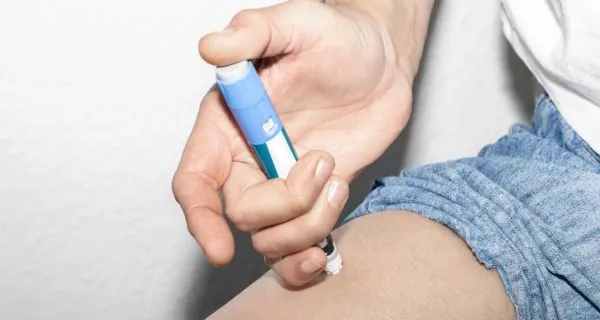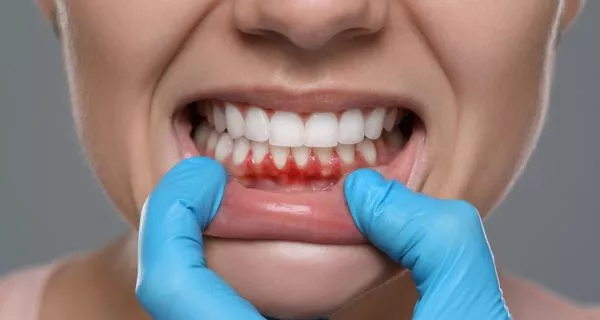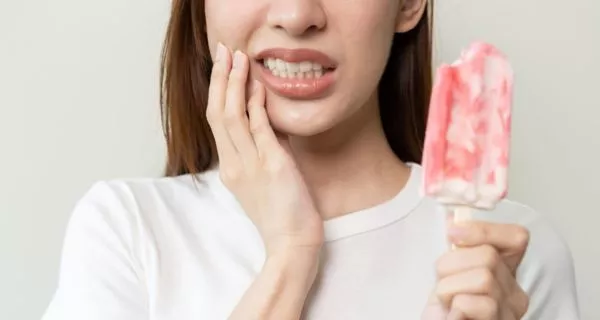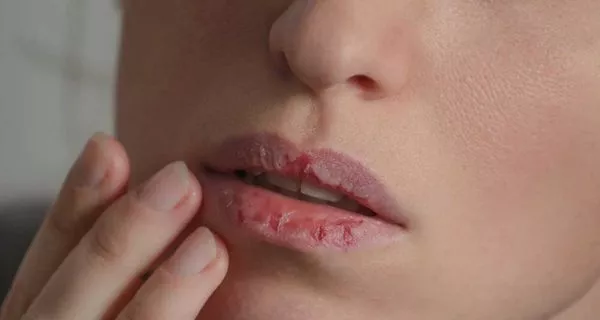Last Updated on: 28th January 2026, 09:18 am
“Ozempic teeth” refers to dental problems that some people experience while taking Ozempic. These problems include dry mouth, sensitive teeth, weak enamel, or bleeding gums. Ozempic may reduce saliva and change nutrition. Drinking water, using fluoride, eating well, and visiting the dentist often can keep your teeth healthy.
Sometimes we take medications that help us with a systemic condition, but at the same time, they can affect our mouth.
This is the case with Ozempic, a popular drug used to control diabetes and support weight loss. It works well for many people, but some users are becoming worried because it could cause oral health problems like dry mouth, gum issues, or sensitive teeth.
These problems are known as “Ozempic teeth”. Learning about it can help you take simple steps to protect your smile and keep your mouth healthy while on this medication.
Table of Contents
Toggle
Ozempic is an injectable medicine used to help adults with type 2 diabetes control their blood sugar. It works by copying a natural hormone called GLP-1 that helps your body release insulin, slow digestion, and reduce appetite.
Because it also helps people eat less and lose weight, many people without diabetes now use Ozempic for weight management.
However, like many medicines, Ozempic can also engender side effects, and some may affect your mouth and teeth.
The term “Ozempic teeth” is not an official medical diagnosis. It’s a phrase people use to describe dental problems that may appear while taking Ozempic.
Your mouth depends on saliva, good nutrition, and balanced acids to stay healthy. Ozempic can change these things by reducing appetite, causing dehydration, and/or leading to acid reflux.

Dry mouth (called xerostomia) means there isn’t enough saliva to wash away food and bacteria. It can lead to:
Tip: Drink plenty of water and chew sugar-free gum to increase saliva flow.
Since Ozempic lowers appetite, some people eat less and skip meals. This can cause low levels of vitamins and minerals like calcium, vitamin D, and vitamin C, all important requirements for strong teeth and gums.
Tip: Eat balanced meals with fruits, vegetables, and dairy to protect your teeth and gums.

Some Ozempic users experience nausea, vomiting, or acid reflux. When stomach acid touches your teeth often, it can wear down enamel and make teeth:
Tip: After reflux or vomiting, rinse your mouth with water or baking soda, then wait 30 minutes before brushing.
People with diabetes already heal more slowly, and when Ozempic changes nutrition or hydration, it can make gum healing even slower. This can cause:
Not everyone will experience these issues, but they show how this medication influences oral health in different ways.

If you take Ozempic, it is important to watch the condition of your mouth. Knowing the possible changes will help you protect your smile and take care of your teeth and gums before any problems worsen.
Let’s go through the early signs, what you can do at home, and how your dentist can help.
Ozempic can sometimes affect saliva flow, which is essential for protecting teeth and gums.
Watch for these early signs:
These symptoms don’t always mean something serious, but they do signal that your mouth needs extra care.
Tell your dentist you are taking Ozempic. Early checkups help prevent long-term damage.

Once you notice the warning signs of Ozempic teeth, the next step is prevention. Simple daily habits and regular visits to your dentist will keep your teeth and gums healthy while using Ozempic.
Drinking water throughout the day helps your mouth stay healthy.
Using fluoride toothpaste and mouth rinse every day makes your enamel stronger.
Even if Ozempic lowers your appetite, eating foods rich in vitamins and minerals helps your teeth and gums stay strong.
Soda, citrus juice, and energy drinks can wear down enamel, especially if your mouth is dry. You can combat it.

Brushing and flossing every day removes the bacteria that can cause cavities and gum problems.
Chewing sugar-free gum or using xylitol lozenges helps your mouth produce more saliva.
Visit the dentist regularly
Regular dental visits help catch small problems early.
Small and consistent habits every day can protect your teeth and gums, even while taking Ozempic.
Dentists can support patients on Ozempic by:
Dentists help you stay healthy while taking Ozempic, preventing “Ozempic teeth” before serious damage occurs.
At Channel Islands Family Dental Office, we understand how medicines like Ozempic can affect your mouth.
Our friendly team can help you with:
Whether you are starting Ozempic or have been using it for a while, we guide you every step of the way to keep your mouth healthy and your smile bright.
We proudly serve Oxnard, Santa Paula, Ventura, Newbury Park, and Port Hueneme.
Book your visit today and take the next step toward a healthy, confident smile that is free from “Ozempic teeth”!
“Ozempic teeth” is a term people use when they notice dental problems while taking Ozempic. It can include dry mouth, sensitive teeth, bleeding gums, or bad breath. Not everyone experiences these problems, but noticing them early helps you protect your smile.
Ozempic is prescribed for adults with type 2 diabetes. Children should not take it unless a doctor specifically recommends it.
1. American Dental Association. (). Ozempic may yield weight loss but also bad breath. ADA. https://adanews.ada.org/huddles/ozempic-may-yield-weight-loss-but-also-bad-breath/
2. Henderson, J. (2025, July 22). ‘Ozempic Teeth’: Another Effect of GLP-1 Agonists? MedPage Today. https://www.medpagetoday.com/popmedicine/cultureclinic/116629
3. Ishver, A. (2025, January 31). Ozempic (semaglutide) – Uses, Side Effects, and More. WebMD. https://www.webmd.com/drugs/2/drug-174491/ozempic-subcutaneous/details#uses
4. Martichoux, A. (2025, August 23). Ozempic teeth: Dentists warn of new GLP-1 side effect. https://thehill.com/policy/healthcare/5467385-ozempic-teeth-new-side-effect-weightloss-drugs/
5. Schimelpfening, N. (2025, June 5). ‘Ozempic teeth’ may cause tooth decay, other dental health effects. Healthline. https://www.healthline.com/health-news/ozempic-teeth-may-impact-dental-health